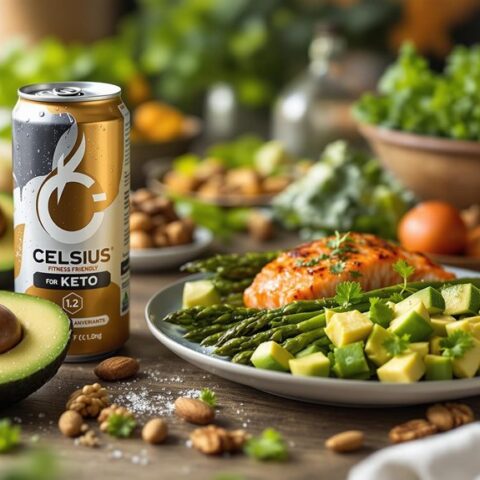
Agave nectar is not considered low-carb due to its high carbohydrate content and concentrated fructose levels of 70-85%. While it boasts a low glycemic index of 19, this masks its significant metabolic impact, as fructose processing in the liver can lead to increased fat storage and insulin resistance. For those following a ketogenic or low-carb diet, alternatives like stevia or monk fruit offer better options without the metabolic drawbacks. Understanding the full spectrum of sweetener effects reveals important distinctions for health-conscious consumers.
Key Takeaways
- Agave nectar contains significant carbohydrates and is not considered low-carb, with high fructose content ranging from 70-85%.
- Despite its low glycemic index of 19, agave's high fructose content can disrupt ketosis and promote fat storage.
- Better low-carb alternatives include stevia, monk fruit, and erythritol, which have minimal impact on blood sugar levels.
- Agave's marketing as a natural sweetener is misleading, as processing destroys beneficial compounds and increases health risks.
- The liver processes agave's high fructose content differently than glucose, potentially leading to increased triglycerides and insulin resistance.
What Makes Agave Nectar Different From Other Sweeteners
While agave nectar has gained popularity as an alternative sweetener due to its low glycemic index of 19, its composition and processing methods set it apart considerably from other sweetening agents.
The distinguishing characteristic of agave nectar lies in its remarkably high fructose content, ranging from 70-85%, which exceeds even that of high fructose corn syrup.
Agave nectar's strikingly high fructose levels of 70-85% surpass those found in high fructose corn syrup, setting it apart from other sweeteners.
Unlike other sweeteners, agave nectar's impact on blood sugar levels is unique because fructose metabolizes primarily in the liver rather than immediately entering the bloodstream.
However, this processing method involves heat or enzymatic treatment that destroys the beneficial fructans naturally present in the agave plant.
Despite its appealing low glycemic profile, the intensive processing and concentrated fructose content make it fundamentally different from both natural and artificial sweetener alternatives.
The Truth About Agave's Glycemic Index
While agave nectar's low glycemic index of 19 appears impressive compared to table sugar's 70, this number masks important concerns about its metabolic impact.
The high fructose content in agave nectar, ranging from 70-85%, doesn't trigger immediate blood sugar spikes, which can create a false sense of security for those monitoring their carbohydrate intake.
Despite its minimal effect on blood glucose levels, agave's concentrated fructose content poses potential long-term health risks, including increased insulin resistance and fatty liver disease.
GI vs. Health Effects
The deceptively low glycemic index of agave nectar, measuring just 19 compared to table sugar's 70, presents a misleading picture of its metabolic impact on the body. While this low number might suggest better blood sugar management, the reality is more complex and potentially concerning.
The high fructose concentration in agave nectar, ranging from 70-85%, poses significant long-term health risks despite not immediately raising blood glucose levels.
This concentrated fructose can lead to insulin resistance and liver disease over time, as the liver becomes overwhelmed processing such large amounts. The chronic consumption of agave's fructose triggers oxidative stress and metabolic complications that are actually more harmful than glucose's direct impact on blood sugar, making glycemic index an inadequate measure of this sweetener's true health effects.
Understanding Blood Sugar Impact
Many consumers misinterpret agave nectar's low glycemic index as a green light for blood sugar management, overlooking its complex metabolic effects.
While agave doesn't cause immediate blood glucose spikes, its high fructose content presents significant long-term health concerns, particularly regarding nutritional value and metabolic health.
Understanding agave's true impact requires examining three key factors:
- Its extremely high fructose concentration (70-85%) can lead to fatty liver disease and insulin resistance.
- The processing methods destroy beneficial compounds found in the original agave plant.
- The sweetener's effects on blood sugar regulation extend beyond immediate glucose response.
Despite marketing claims focusing on its low glycemic index, agave nectar's metabolic impact makes it a questionable choice for those seeking healthy sugar alternatives.
Fructose's Deceptive Nature
Consumers drawn to agave nectar's seemingly favorable glycemic index often overlook its more complex metabolic implications.
While its low glycemic index of 19 appears attractive compared to table sugar's 70, this measurement masks a concerning reality about agave's composition.
The sweetener's high fructose content, approximately 70%, presents significant challenges to metabolic health despite its modest impact on blood sugar levels.
Unlike glucose, fructose processing occurs primarily in the liver, potentially leading to increased fat storage and insulin resistance over time.
This metabolic pathway can disrupt ketosis and compromise long-term health outcomes, making agave nectar a less suitable option for low-carb diets than its glycemic index might suggest.
Alternative sweeteners like stevia or monk fruit offer better options for those monitoring their carbohydrate intake.
Breaking Down the Fructose Factor
While agave nectar is often marketed as a healthier alternative to traditional sweeteners, its exceptionally high fructose content raises considerable concerns for those monitoring their carbohydrate intake.
With fructose levels reaching up to 85%, agave greatly exceeds the fructose content found in both table sugar and high fructose corn syrup, potentially impacting metabolic health.
The liver's unique role in processing fructose presents several challenges:
- Increased liver stress due to concentrated fructose metabolism
- Higher risk of heightened triglyceride levels compared to glucose-based sweeteners
- Greater potential for insulin resistance and fatty liver development
The absence of fiber in agave nectar compounds these issues, as fiber typically helps moderate fructose absorption when consumed in whole fruits.
Despite its low glycemic index, agave's concentrated fructose content warrants careful consideration.
Metabolic Effects of Agave Consumption
While agave nectar's low glycemic index suggests minimal immediate blood sugar impacts, its high fructose content triggers complex metabolic responses that can lead to long-term insulin resistance.
The liver's unique role in processing fructose creates a different metabolic pathway compared to glucose, potentially causing increased triglyceride production and altered insulin sensitivity over time.
These metabolic effects make agave nectar particularly problematic for maintaining stable blood sugar levels and achieving ketosis, despite its initially promising glycemic profile.
Insulin Response Mechanisms
Although agave nectar boasts a remarkably low glycemic index of 19, its metabolic effects on the body present a complex interplay of responses that extend beyond simple blood sugar measurements.
The high fructose content triggers distinct metabolic pathways that can greatly impact long-term health outcomes.
Key insulin response mechanisms include:
- Limited insulin secretion due to fructose bypassing normal glucose metabolism
- Gradual development of insulin resistance through sustained liver processing of fructose
- Altered metabolic health markers, including increased blood triglycerides and LDL cholesterol
While agave doesn't cause immediate blood sugar spikes, its high fructose concentration can disrupt metabolic processes over time, particularly affecting those pursuing ketogenic or low-carb lifestyles.
This unique metabolic pathway makes agave a questionable choice for individuals focused on maintaining stable insulin sensitivity.
Blood Sugar Impact Timeline
Because agave nectar's metabolic effects unfold over distinct time periods, understanding its blood sugar impact requires examining both immediate and long-term consequences.
Initially, agave nectar's low glycemic index of 19 results in a gradual blood sugar elevation, making it appear more favorable than traditional table sugar for immediate glucose management.
However, the high fructose content in agave nectar triggers a complex metabolic cascade over time. While blood sugar remains relatively stable in the short term, the liver's processing of fructose gradually leads to increased triglycerides and potential insulin resistance.
This delayed response pattern means that while consumers might not experience immediate blood sugar spikes, the cumulative effects of regular agave nectar consumption can contribute to metabolic complications and impaired glucose regulation over months or years.
Agave Vs High Fructose Corn Syrup
Despite marketing claims positioning them as natural alternatives to sugar, both agave nectar and high fructose corn syrup (HFCS) present significant health concerns, with agave containing even higher levels of fructose than its corn-based counterpart.
Marketing hype aside, agave nectar and high fructose corn syrup both pose health risks, with agave packing more fructose than HFCS.
While HFCS typically contains 55-58% fructose, agave nectar's fructose content ranges from 70-85%, potentially leading to more severe metabolic issues and liver problems.
Key differences between agave nectar and HFCS:
- Fructose concentration: Agave contains substantially more fructose (70-85%) compared to HFCS (55-58%)
- Processing impact: Both sweeteners lose beneficial properties during manufacturing
- Health effects: Agave's higher fructose content may cause more significant oxidative stress and metabolic complications
Both sweeteners share similarly low glycemic indices, but this characteristic shouldn't be mistaken for healthfulness, as excessive fructose consumption can contribute to insulin resistance and other metabolic disorders.
Why Natural Doesn't Always Mean Healthy
The common perception that natural sweeteners are inherently healthier creates a problematic misconception in the health food market.
While products like agave nectar carry the "natural" label, their processing methods and high fructose content can make them potentially more harmful than conventional sweeteners.
The reality is that many natural sweeteners undergo significant processing that strips away beneficial compounds found in their original plant sources.
In the case of agave nectar, the refinement process transforms it into a concentrated sweetener with fructose levels even higher than high fructose corn syrup.
This high concentration of fructose can lead to metabolic issues, regardless of its natural origin.
Understanding these facts helps consumers make more informed decisions, rather than relying solely on marketing terms that emphasize natural sourcing.
The Ketogenic Diet and Agave Compatibility
Although agave nectar's low glycemic index might seem attractive for ketogenic dieters, its high fructose content poses significant challenges for maintaining ketosis. The metabolic processing of fructose differs from other carbohydrates, potentially disrupting the body's ability to efficiently burn fat for fuel, even when total carbohydrate intake appears low. While net carbs often guide keto-friendly food choices, the concentrated fructose in agave can trigger metabolic responses that work against the fundamental goals of ketogenic eating. Moreover, ongoing adherence to the ketogenic diet supports steady blood sugar levels, which is crucial for managing type 2 diabetes.
Metabolic Impact During Ketosis
Many ketogenic dieters find agave nectar's low glycemic index of 19 appealing, yet this natural sweetener poses significant challenges for maintaining ketosis. The high fructose content, ranging from 70-85%, can trigger metabolic disruptions that interfere with the ketogenic diet's effectiveness.
The metabolic impact of agave nectar during ketosis includes:
- Increased risk of insulin resistance due to chronic fructose consumption
- Raised blood triglyceride levels that can impede fat burning
- Potential weight gain from compromised metabolic function
Unlike whole fruits that contain beneficial fiber and nutrients to offset their fructose content, agave nectar lacks these protective components.
This absence of nutritional benefits, combined with its concentrated fructose levels, makes it unsuitable for those seeking to maintain stable ketosis.
Net Carbs Vs Fructose
While agave nectar's net carb content appears deceptively low on paper, its high concentration of fructose presents unique challenges for individuals following a ketogenic diet. The sweetener contains 70-85% fructose, which processes differently than other carbohydrates in the body.
Unlike standard carbohydrates that directly affect blood glucose levels, fructose undergoes liver metabolism, potentially disrupting ketosis through indirect mechanisms. This distinction makes traditional net carb calculations less reliable when evaluating agave nectar's compatibility with a ketogenic diet.
The liver's processing of high fructose loads can lead to increased triglyceride production and visceral fat accumulation, compromising the metabolic benefits typically sought through ketogenic eating. For those committed to maintaining stable ketosis, alternative sweeteners like stevia or erythritol offer more predictable metabolic responses.
Hidden Dangers of Fructose Processing
Despite its reputation as a natural sweetener, agave nectar undergoes an intensive processing method that transforms its beneficial fructans into concentrated fructose, creating a product that contains up to 85% fructose – far higher than regular table sugar.
Don't be fooled by agave's natural image – processing strips away its benefits, leaving behind dangerously high levels of concentrated fructose.
The intensive processing of agave leads to several significant health issues that consumers should be aware of:
- The liver's metabolism of concentrated fructose increases blood triglycerides and LDL cholesterol, potentially leading to fatty liver disease.
- Excessive fructose consumption contributes to belly fat accumulation and insulin resistance due to its unique metabolic pathway.
- The processed agave produces up to 100 times more oxidative stress compared to other sweeteners, making it particularly damaging to cellular health.
Unlike whole fruits, which contain fiber to buffer fructose absorption, processed agave offers no protective benefits against these metabolic concerns.
Better Alternatives for Low-Carb Diets
For those seeking healthier alternatives to agave nectar, several natural sweeteners offer superior options for maintaining a low-carb lifestyle.
Stevia, derived from plant leaves, provides zero-calorie sweetness without impacting carbohydrate intake or blood sugar levels. Similarly, monk fruit sweetener delivers natural sweetness while maintaining ketosis and supporting metabolic health.
Erythritol stands out as another excellent choice, containing minimal calories at 0.24 per gram and zero impact on blood sugar.
Unlike agave's high fructose content, these alternatives allow individuals to enjoy sweet flavors without compromising their low-carb dietary goals.
Each option can be effectively incorporated into recipes and beverages, providing the sweetness consumers desire while helping them avoid the metabolic risks associated with high-fructose sweeteners like agave nectar.
Additionally, xylitol's promotion of dental health by reducing cavity-causing bacteria offers an added benefit for those looking to maintain oral hygiene while adhering to a low-carb diet.
Making Informed Sweetener Choices
Making informed decisions about sweetener choices requires a thorough understanding of their nutritional impact and metabolic effects.
Choosing the right sweeteners demands careful analysis of how they affect both nutrition and metabolism throughout the body.
When evaluating sweeteners for a low-carb lifestyle, consumers should look beyond marketing claims and glycemic index numbers to understand the complete metabolic picture. While agave nectar's low glycemic index might seem appealing, its high fructose content can derail low-carb dietary goals.
Key considerations when choosing sweeteners:
- Total carbohydrate content per serving, not just glycemic index
- Fructose concentration and its potential metabolic effects
- Impact on ketosis maintenance and blood sugar stability
Understanding the difference between total and net carbohydrates is essential for managing a low-carb diet effectively.
Frequently Asked Questions
Is Agave a Low Carb Sweetener?
Despite agave's low glycemic index, its nutritional profile reveals high fructose content, making it unsuitable for low-carb diets. Unlike stevia, agave can disrupt ketosis and metabolic health.
Does Agave Spike Glucose Levels?
Agave has a lower glycemic index than honey, minimally impacting immediate blood glucose levels. However, its high fructose content poses significant long-term health effects through liver processing and metabolic disruption.
What Is the Dark Truth About Agave Syrup?
Agave processing methods strip natural health benefits, creating a highly processed syrup with 85% fructose content. Unlike honey's natural composition, agave's concentrated fructose can lead to metabolic issues and liver problems.
What Is the Lowest Carb Sweetener?
Among natural sweeteners, erythritol and monk fruit rank as the lowest-carb, keto-friendly options, containing virtually zero carbohydrates. Stevia follows closely, offering similar sugar alternatives benefits without impacting blood sugar levels.
Conclusion
While agave nectar is often marketed as a natural, low-glycemic sweetener, its high fructose content and processing methods make it unsuitable for low-carb diets. The metabolic impact of concentrated fructose, combined with agave's total carbohydrate content, can disrupt ketosis and potentially contribute to health concerns. Those following low-carb lifestyles should consider alternatives like stevia, monk fruit, or erythritol, which better align with their dietary goals while minimizing metabolic risks.










No Comments